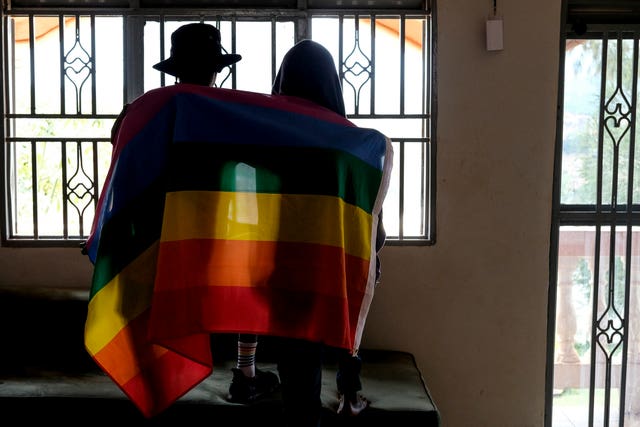Uganda’s president signs tough anti-gay legislation into law
The legislation prescribes the death penalty for ‘aggravated homosexuality’, though it does not criminalise people who identify as LGBTQ.
Uganda’s president has signed into law tough new anti-gay legislation supported by many in the East African country, but widely condemned by rights activists and others abroad.
The version of the Bill signed by President Yoweri Museveni does not criminalise those who identify as LGBTQ, a key concern for campaigners who condemned an earlier draft of the legislation as an egregious attack on human rights.
However, the new law still prescribes the death penalty for “aggravated homosexuality”, which is defined as cases of sexual relations involving people infected with HIV as well as with minors and other categories of vulnerable people.
A suspect convicted of “attempted aggravated homosexuality” can be imprisoned for up to 14 years, according to the legislation.
Parliamentary Speaker Anita Among said in a statement that the president had “answered the cries of our people” in signing the Bill.

“With a lot of humility, I thank my colleagues the Members of Parliament for withstanding all the pressure from bullies and doomsday conspiracy theorists in the interest of our country,” the statement said.
Mr Museveni had returned the Bill to the national assembly in April, asking for changes that would differentiate between identifying as LGBTQ and actually engaging in homosexual acts.
That angered some legislators, including some who feared the president would proceed to veto the Bill amid international pressure. Parliament passed an amended version of the Bill earlier in May.
Homosexuality was already illegal in Uganda under a colonial-era law criminalising sexual activity “against the order of nature”.
The punishment for that offence is life imprisonment.
The US has warned of economic consequences over legislation described by Amnesty International as “draconian and overly broad”.

The leaders of the UN Aids programme, the US President’s Emergency Plan for Aids Relief and the Global Fund said in a joint statement they “are deeply concerned about the harmful impact” of the legislation on public health and the HIV response.
“Uganda’s progress on its HIV response is now in grave jeopardy,” the statement said.
“The Anti-Homosexuality Act 2023 will obstruct health education and the outreach that can help end Aids as a public health threat.”
That statement noted that “stigma and discrimination associated with the passage of the Act has already led to reduced access to prevention as well as treatment services” for LGBTQ people.
Anti-gay sentiment in Uganda has grown in recent weeks amid news coverage alleging sodomy in boarding schools, including a prestigious one for boys where a parent accused a teacher of abusing her son.
In February, the Church of England’s national assembly decided to continue banning church weddings for same-sex couples while allowing priests to bless same-sex marriages and civil partnerships, inflaming many in Uganda and elsewhere in Africa.
Homosexuality is criminalised in more than 30 of Africa’s 54 countries.
Some Africans see it as behaviour imported from abroad, and not a sexual orientation.





